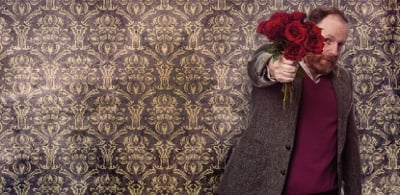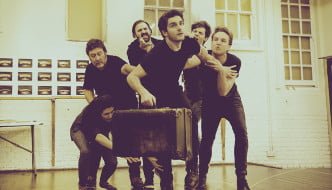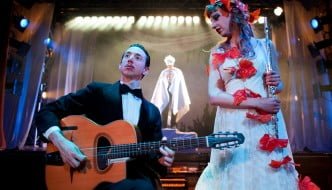Review: Uncle Vanya at West Yorkshire Playhouse
March 30, 2015

Images courtesy of the West Yorkshire Playhouse
There’s a lot to love about the West Yorkshire Playhouse production of Uncle Vanya, so it was disappointing to see the Quarry Theatre only a third full on a Friday evening, as the excellence of the cast and the design – and of the play itself – managed to rise above a handful of irritating quirks of the version and direction.
Chekhov’s play is strikingly modern anyway, with deeply contemporary political resonances for our environmental and political concerns. However, Samuel Adamson’s new version of the play appears to strive for a superficial, colloquial modernity that frequently grates, rather than – as Artistic Director James Brining hopes in his programme notes – “preparing this wonderful play for a 21st century outing”. Modern slang contrasts with the characters’ dress (which itself falls somewhere period and contemporary) and as those who are about to depart ask for their horses, we hear car engines, as if the production simply cannot make up its mind in which era it belongs.

Some of the cast, too, are hampered by such indecision. Dorothea Myer-Bennett, as Sonya, is very good indeed as the unspoken heart of the play (it’s her relation to Vanya that allows him to be described as ‘Uncle’). But the direction puts her through several hoops: in her scenes with her unrequited love object, Astrov (Ryan Kiggell), she’s required to play with the ostentatious repression of a minor character in a Richard Curtis film, while when she shares the secret of her passion with Yelena (Georgina Rylance), she does so with such a modern-girl gush that – OMG! – I was almost expecting text speak.
Another character that the production doesn’t seem to know what to do with is the dependent on the main family, Waffles (Graham Turner). The production suspends him somewhere between Shakespearean fool and Peter Sallis as Clegg, in Last of the Summer Wine. However, his equivocal social position seems pivotal in a world changing rapidly, with frequent references to the cracks in the aristocratic structure of Russian society, which was of course to crumble in the revolution, just 18 years after the play’s first production. This production (rightly) emphasises the ecological elements in the play, but fluffs an opportunity to give a modern resonance to the social flux that is an intrinsic part of Uncle Vanya.

However, the cast copes well with inconsistencies of the production. Vanya himself (David Ganly) is a simmering pot of frustration – sexual as well as social – that frequently boils over, culminating in his farcical attempted shooting of Serebryakov (John Bett). Kiggell, likewise, conveys Astrov’s talent dissipating in the ennui of the decaying Russian countryside. If the impression left by Georgina Rylance’s Yelena is one of vapidity, that is entirely appropriate for the bored, trivial femme fatale of the claustrophobic society.
I was impressed by the evocation of deep Russian forest: there was not just the brooding visual impact of a cluster of telegraph poles, but somehow, there was even a dank, sylvan aroma that the set managed to achieve.
However, the real focus is the play itself. Chekhov does not foreground emotion, so the impact is something of a slow burn. But by the end, the force of repression is overpowering, with Vanya and Sonya’s inability to go on, but their determination to do so, almost foreshadowing Beckett.
It’s a great play for any age and the cast more than do it justice.
For more information, click here.
Filed under: Theatre & Dance
Tagged with: performance, theatre, Uncle Vanya, West Yorkshire Playhouse



Comments